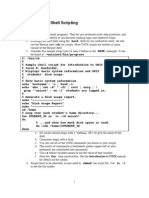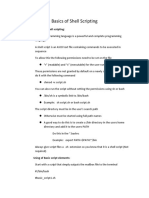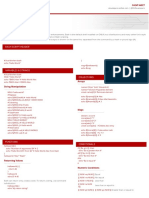0% found this document useful (0 votes)
5 views9 pages6-Mock Interview Answers (Shell Scripting)
The document provides mock interview answers related to shell scripting, covering various topics such as retrieving script names, checking command success, writing functions, and using loops. It includes example scripts and outputs for tasks like reversing strings, performing arithmetic operations, and managing user accounts. Additionally, it discusses concepts like umask and swap memory in Linux.
Uploaded by
ganeshkalagoniCopyright
© © All Rights Reserved
We take content rights seriously. If you suspect this is your content, claim it here.
Available Formats
Download as PDF, TXT or read online on Scribd
0% found this document useful (0 votes)
5 views9 pages6-Mock Interview Answers (Shell Scripting)
The document provides mock interview answers related to shell scripting, covering various topics such as retrieving script names, checking command success, writing functions, and using loops. It includes example scripts and outputs for tasks like reversing strings, performing arithmetic operations, and managing user accounts. Additionally, it discusses concepts like umask and swap memory in Linux.
Uploaded by
ganeshkalagoniCopyright
© © All Rights Reserved
We take content rights seriously. If you suspect this is your content, claim it here.
Available Formats
Download as PDF, TXT or read online on Scribd
/ 9






















































































